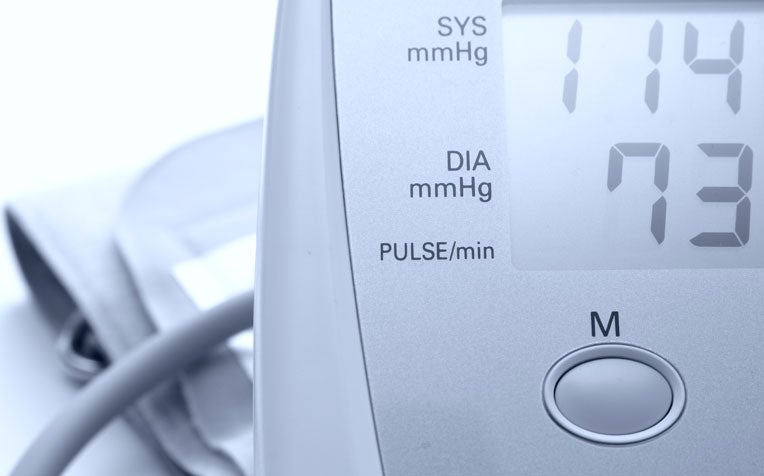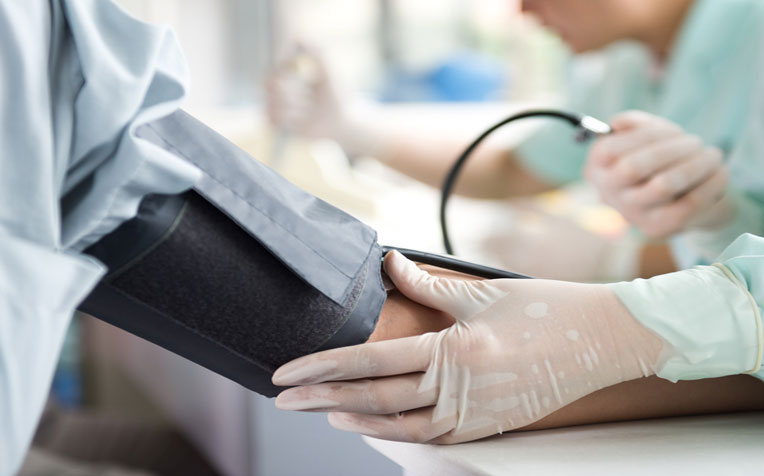
High blood pressure can cause severe damage to your heart, eyes and brain if it isn't under control.
High blood pressure (hypertension) is a silent killer
High blood pressure or hypertension is a silent killer that increases your risk of stroke, heart disease and other serious health complications if left unchecked.
Most people with high blood pressure feel normal (have no headaches or tightness in the neck, etc), even when their blood pressure is moderately high. Thus, many are not even aware that they have hypertension.
"This is why you should have your blood pressure checked at least once a year, and more frequently if you are on medication," says Dr Ian Phoon, Senior Consultant, SingHealth Polyclinics, a member of the SingHealth group.
High blood pressure (hypertension) in Singapore
Blood pressure measures how hard the heart has to work to pump blood through the arteries. According to the Health Promotion Board (HPB), high blood pressure affects more than half of Singaporeans aged 60 to 69 and about one in four aged 30 to 69. You have high blood pressure (hypertension) if your blood pressure reading is 140/90 mmHg or higher in the clinic.
If you have a home blood pressure set, you should check your blood pressure regularly, and record it. Blood pressure varies throughout the day, and taking your pressure at different times will allow your doctor to see your average blood pressure. Show this record to your doctor at each visit.
10 Complications arising from high blood pressure (hypertension)
Here are 10 health reasons to keep your blood pressure under control:
- High blood pressure can damage your arteries
High blood pressure exerts extra force on the artery walls. Over time, it can damage your arteries (blood vessels) and make them more susceptible to plaque (fatty deposits) buildup, a condition called atherosclerosis. The hardened and narrowed arteries will disrupt blood flow to various organs in the body. Think of it as a clogged sink.
- High blood pressure can cause heart disease
Atherosclerosis causes arteries of the heart to thicken, blocking blood and oxygen supply to the heart muscles. You may experience chest pains or irregular heart rhythms (arrhythmias). A heart attack occurs when blood clots completely block oxygen supply to the heart muscles. One out of three deaths in Singapore in 2011 was due to heart disease or stroke.
- High blood pressure can damage your brain cells
Blood clots may cut oxygen supply to the brain cells. This causes the brain cells to die and stroke or dementia to occur. The bursting of arteries in the brain may cause bleeding in the brain, resulting in a stroke.
- High blood pressure can affect your eyesight
Uncontrolled high blood pressure causes the blood vessels in the eye to thicken and narrow, disrupting blood supply to the retina (the light-sensitive part of your eye – like a camera “film”). Blurred vision can result. The retinal veins may burst and cause bleeding in the eye. If blood pressure remains untreated, these conditions, known as hypertensive retinopathy, can lead to total vision loss.
- High blood pressure (hypertension) can cause kidney failure
Hypertension (high blood pressure) can damage the arteries leading to the kidneys and the blood vessels in the kidneys. "This affects the kidneys’ ability to remove excess water and waste products from the blood. In turn, this may lead to kidney failure," says Dr Ian Phoon, Consultant, SingHealth Polyclinics (SHP), a member of the SingHealth group.
- Hypertension may cause sexual dysfunction
In men, hypertension can cause erectile dysfunction (ED). It may make it more difficult for a man to have or maintain an erection due to reduced blood flow to the damaged penile arteries. Women with hypertension may experience vaginal dryness and lower sex drive.
- Hypertension can cause bone loss
People with hypertension tend to excrete more calcium in the urine. Excessive calcium loss can lead to loss in bone density. The body needs calcium to maintain strong bones and teeth, and help blood vessels move blood throughout the body.
- Hypertension is associated with sleep problems
People who are overweight and tend to snore may have obstructive sleep apnoea (OSA). This is a condition in which one repeatedly stops breathing momentarily or has shallow breathing during sleep. Symptoms are daytime sleepiness despite adequate hours of sleep. People with OSA tend to have higher blood pressure.
- Hypertension is a sign of preeclampsia in pregnant women
Preeclampsia, a condition characterised by hypertension (high blood pressure) and protein in the urine, affects a small percentage of pregnant women. Uncontrolled high blood pressure affects the unborn child’s growth as blood flow to the placenta reduces. Severe preeclampsia or eclampsia, where the mother suffers from seizures and convulsions, may develop.
- Hypertension is one of the components of the metabolic syndrome
Metabolic syndrome is a group of risk factors that increases your risk for heart disease and stroke. These factors include high blood pressure, excess abdominal fat, high cholesterol and high glucose levels.
How to have good control of your blood pressure
You should check your blood pressure at least once a year. Marginally elevated blood pressure may normalise when you lose weight, exercise more and reduce salt intake.
1. Eat healthier
Avoid foods high in cholesterol and saturated fats such as animal fats, whole milk products, eggs, red meat such as beef and lamb, coconut milk and palm oil. Instead, choose lean meat, fish and low-fat dairy products and increase your intake of fruits and vegetables. Cut back on salty foods as well.
2. Exercise regularly
Exercise at least three times a week. Aim for at least 150 minutes light to moderate activity per week, 30 mins per day.
Although there are many kinds of physical activities you could do, walking is one of the best forms of exercise to do. To find out which types of physical activities are suitable for you, check with your doctor.
3. Watch your weight
It has been proven that maintaining a healthy body weight reduces the risks of high blood pressure. To give you a good idea of whether you are keeping a healthy weight, refer to this table.
Body Mass Index (BMI) Classification by Public Health Action in Asians
Body mass index (BMI) = Weight (kg) / (Height x Height (m))
| BMI (kg/m2) (for adults) | Risk of heart disease and diabetes |
| 27.5 and above | High Risk |
| 23.0 - 27.4 | Moderate Risk |
| 18.5 - 22.9 | Low Risk (healthy range) |
| Less than 18.5 | Risk of nutritional deficiency diseases and osteoporosis |
Source: Health Promotion Board
4. Say no to smoking and drinking alcohol
Smoking and heavy drinking raises blood pressure. Smoking is also a risk factor for coronary artery disease and stroke. If you choose to drink, moderate your intake to not more than one standard drink per day (e.g. 100ml wine = 1 standard drink).
5. Manage your stress
To manage stress, engage in regular exercises. Adopt a balanced approach to work and family life. In addition, relax whenever possible to ease the tension whenever feelings of stress arise since stress may aggravate your blood pressure.
If these measures are not successful, then drug treatment maybe needed. However, once medicine has been started, it is essential to continue with the treatment, complemented by a healthy lifestyle. Treatment of hypertension for most people is life-long.
Ref: G25 (ed)
Related articles:
Hypertension: Understanding Blood Pressure Ranges
High Blood Pressure: Top 5 Myths
High Blood Pressure: 5 Ways to Lower It Without Medication
3 Foods to Avoid to Prevent High Blood Pressure
4 Foods to Eat to Bring Down High Blood Pressure


















 Get it on Google Play
Get it on Google Play